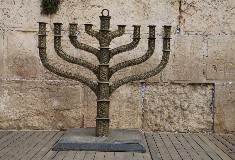Prayers That Pour: The Power of Gratitude and Asking for More
הרב שי טחןיב שבט, תשפה10/02/2025This highlights the importance of not only expressing gratitude but also continuing to pray for ongoing blessings
תגיות:תפילהבקשהמוסר
A few weeks ago, we wrote about the new song that has become almost a Jewish anthem, proclaiming that Hashem loves me and that I will always have only good, and more good, and more good.
Following the many comments we received on that article—despite not taking a side but merely presenting the two opinions— some expressed hurt over the Rambam’s statement that Hashem despises the wicked. Others were upset by the challenge to the positive notion that we should feel we will only experience good, while others emphasized the importance of maintaining a balance between optimism and realism, arguing that overly simplistic interpretations could lead to disappointment or confusion when challenges arise. Still, others appreciated the discussion, feeling it highlighted the depth and nuance of Jewish faith and trust in Hashem.
maintaining a balance between optimism and realism, arguing that overly simplistic interpretations could lead to disappointment or confusion when challenges arise. Still, others appreciated the discussion, feeling it highlighted the depth and nuance of Jewish faith and trust in Hashem.
The article discussed the significant controversy surrounding these lyrics, as some rabbis felt they were not aligned with our mesorah for several reasons. One of the main concerns is the claim that a person cannot assert with certainty that they will experience only good. The Chazon Ish explains that the true meaning of bitachon—trust in Hashem—is not the belief that we are guaranteed to receive what we desire, as we do not know the future and are not prophets. Rather, bitachon means trusting that everything that happens is from Hashem and is ultimately for the best.
We also explained that we believe whatever Hashem does for us is ultimately what is best at any given moment, even if we don’t fully understand it. Therefore, saying "we will only have good" may seem to contradict this notion, as the good we desire might not align with the true good that Hashem has intended for us. Thus, one must trust that whatever Hashem brings their way is the ultimate good.
On the surface, this understanding—rooted in the writings of many Rishonim who explain the concept of bitachon—seems to contrast with the famous words of the Tzemach Tzedek, who popularized the saying, “Think good, and it will be good.” This phrase suggests that our mindset has the power to influence and shape our destiny toward the good we desire. In contrast, the Rishonim explained that it is our mitzvot and aveirot that determine our future outcomes. While there is also a concept known as the obligations of the heart, which means that feelings and mindset do play a role, their influence is similar to performing the physical mitzvot. In other words, fulfilling the obligations of the heart may impact our future, but it does not guarantee that our desires will be fulfilled.
In that article, we briefly outlined various points, each of which requires further exploration and detailed explanation. Today, we would like to delve deeper into the question: Is it correct to say, "I will have better and better," if I don’t know the future?
One could argue that the song is not suggesting certainty about the future but rather expressing a plea to Hashem for things to improve. The issue with this is that the words seem to suggest not a prayer, but rather a statement of fact that things will be good.
Chabad Chassidim have uncovered a fascinating letter from the Lubavitcher Rebbe, emphasizing that one should always ask Hashem for more and more good. However, this differs from the song, as we explained, because the song declares that we will only have good as a statement of fact, not as a request.
However, even if we interpret the lyrics as a form of prayer, this raises another question: If Hashem always provides what is best for us, how can we ask for "better"? If something "better" were truly good for us, wouldn’t Hashem have already given it?
The answer lies in the essence of tefila (prayer). Hashem wants us to ask for improvements and the things we desire, such as health, success, livelihood, a good match, righteous children, and more. Hashem waits for us to express our requests in prayer as a way to connect with Him, and it is through this connection that He grants us blessings.
Thus, when we say, “I will have more good,” we are not negating the belief that our current situation is good. Rather, we are expressing our hope and request that the future will be even better. For example, the Patriarchs and Matriarchs were initially childless because Hashem desired their heartfelt prayers for children. Their prayers became a source of merit, deepening their connection to Hashem and paving the way for blessings to flow.
Without asking for good, Hashem may hold it back, even if we deserve it. When Hashem created the trees, they were initially fruitless because humans had not yet been created to pray for rain to make them grow. This principle extends even further (Rashi Bereshit 2; 5).
The mefarshim explain that when one receives abundant good from Hashem, they should ask for more. Without asking, the flow of blessing may cease. We learn this from Leah, who, after giving birth to her fourth son, Yehudah, thanked Hashem (Bereshit 29; 35). The following words in the pasuk state that she stopped having children.
The Ibn Ezra seems to wonder why she stopped having children and why she would be "punished" for expressing gratitude to Hashem. He answers that because Leah thanked Hashem without simultaneously asking for more, the abundance stopped. When one thanks Hashem without asking for more, it indicates a sense of satisfaction, as if they don't need or want anything more. In this way, it’s as though one is telling Hashem to stop pouring additional blessings.
This highlights the importance of not only expressing gratitude but also continuing to pray for ongoing blessings.
We say Birkat HaGomel to thank Hashem for being saved from danger or distress, such as recovering from illness, traveling safely, or recovering from a sickness. It is a public acknowledgment of gratitude to Hashem for His kindness.
The crowd responds, "Mi shegemalcha kol tov hu yigmalcha kol tov selah"—"May He who has bestowed good upon you continue to bestow good upon you forever." Rav Baruch Epstein (author of Torah Tmima in Baruch Sheamar) explains this response in line with the principle we discussed above. It not only expresses gratitude on behalf of the congregation but also includes a request for continued blessings, emphasizing the idea that thanking Hashem should be accompanied by asking for more good.
Rabbi Yaakov Yitzchak of Lublin derived this insight from the story of Choni HaMe’agel (Taanit 23). In the story, Choni prayed for rain, resulting in an overabundance, far more than necessary. When the people pleaded with him to pray for the rain to stop, he instructed them to bring a bull for thanksgiving (Par Hoda’ah). As the narrative recounts, they brought the bull, Choni offered it, and the rain ceased.
The Rebbe of Lublin explained that Choni’s act carried a profound message: by offering the Par Hoda’ah, he signified that the community had fully emerged from their distress and no longer needed the additional blessings of rain. This acknowledgment itself naturally brought the rainfall to an end.
To summarize, it is recommended that while singing, one should have the intention of asking Hashem for more good. However, if one simply has in mind the assurance that only good will come, it is highly controversial, as we cannot know the future.
Following the many comments we received on that article—despite not taking a side but merely presenting the two opinions— some expressed hurt over the Rambam’s statement that Hashem despises the wicked. Others were upset by the challenge to the positive notion that we should feel we will only experience good, while others emphasized the importance of

The article discussed the significant controversy surrounding these lyrics, as some rabbis felt they were not aligned with our mesorah for several reasons. One of the main concerns is the claim that a person cannot assert with certainty that they will experience only good. The Chazon Ish explains that the true meaning of bitachon—trust in Hashem—is not the belief that we are guaranteed to receive what we desire, as we do not know the future and are not prophets. Rather, bitachon means trusting that everything that happens is from Hashem and is ultimately for the best.
We also explained that we believe whatever Hashem does for us is ultimately what is best at any given moment, even if we don’t fully understand it. Therefore, saying "we will only have good" may seem to contradict this notion, as the good we desire might not align with the true good that Hashem has intended for us. Thus, one must trust that whatever Hashem brings their way is the ultimate good.
On the surface, this understanding—rooted in the writings of many Rishonim who explain the concept of bitachon—seems to contrast with the famous words of the Tzemach Tzedek, who popularized the saying, “Think good, and it will be good.” This phrase suggests that our mindset has the power to influence and shape our destiny toward the good we desire. In contrast, the Rishonim explained that it is our mitzvot and aveirot that determine our future outcomes. While there is also a concept known as the obligations of the heart, which means that feelings and mindset do play a role, their influence is similar to performing the physical mitzvot. In other words, fulfilling the obligations of the heart may impact our future, but it does not guarantee that our desires will be fulfilled.
In that article, we briefly outlined various points, each of which requires further exploration and detailed explanation. Today, we would like to delve deeper into the question: Is it correct to say, "I will have better and better," if I don’t know the future?
One could argue that the song is not suggesting certainty about the future but rather expressing a plea to Hashem for things to improve. The issue with this is that the words seem to suggest not a prayer, but rather a statement of fact that things will be good.
Chabad Chassidim have uncovered a fascinating letter from the Lubavitcher Rebbe, emphasizing that one should always ask Hashem for more and more good. However, this differs from the song, as we explained, because the song declares that we will only have good as a statement of fact, not as a request.
However, even if we interpret the lyrics as a form of prayer, this raises another question: If Hashem always provides what is best for us, how can we ask for "better"? If something "better" were truly good for us, wouldn’t Hashem have already given it?
The answer lies in the essence of tefila (prayer). Hashem wants us to ask for improvements and the things we desire, such as health, success, livelihood, a good match, righteous children, and more. Hashem waits for us to express our requests in prayer as a way to connect with Him, and it is through this connection that He grants us blessings.
Thus, when we say, “I will have more good,” we are not negating the belief that our current situation is good. Rather, we are expressing our hope and request that the future will be even better. For example, the Patriarchs and Matriarchs were initially childless because Hashem desired their heartfelt prayers for children. Their prayers became a source of merit, deepening their connection to Hashem and paving the way for blessings to flow.
Without asking for good, Hashem may hold it back, even if we deserve it. When Hashem created the trees, they were initially fruitless because humans had not yet been created to pray for rain to make them grow. This principle extends even further (Rashi Bereshit 2; 5).
The mefarshim explain that when one receives abundant good from Hashem, they should ask for more. Without asking, the flow of blessing may cease. We learn this from Leah, who, after giving birth to her fourth son, Yehudah, thanked Hashem (Bereshit 29; 35). The following words in the pasuk state that she stopped having children.
The Ibn Ezra seems to wonder why she stopped having children and why she would be "punished" for expressing gratitude to Hashem. He answers that because Leah thanked Hashem without simultaneously asking for more, the abundance stopped. When one thanks Hashem without asking for more, it indicates a sense of satisfaction, as if they don't need or want anything more. In this way, it’s as though one is telling Hashem to stop pouring additional blessings.
This highlights the importance of not only expressing gratitude but also continuing to pray for ongoing blessings.
We say Birkat HaGomel to thank Hashem for being saved from danger or distress, such as recovering from illness, traveling safely, or recovering from a sickness. It is a public acknowledgment of gratitude to Hashem for His kindness.
The crowd responds, "Mi shegemalcha kol tov hu yigmalcha kol tov selah"—"May He who has bestowed good upon you continue to bestow good upon you forever." Rav Baruch Epstein (author of Torah Tmima in Baruch Sheamar) explains this response in line with the principle we discussed above. It not only expresses gratitude on behalf of the congregation but also includes a request for continued blessings, emphasizing the idea that thanking Hashem should be accompanied by asking for more good.
Rabbi Yaakov Yitzchak of Lublin derived this insight from the story of Choni HaMe’agel (Taanit 23). In the story, Choni prayed for rain, resulting in an overabundance, far more than necessary. When the people pleaded with him to pray for the rain to stop, he instructed them to bring a bull for thanksgiving (Par Hoda’ah). As the narrative recounts, they brought the bull, Choni offered it, and the rain ceased.
The Rebbe of Lublin explained that Choni’s act carried a profound message: by offering the Par Hoda’ah, he signified that the community had fully emerged from their distress and no longer needed the additional blessings of rain. This acknowledgment itself naturally brought the rainfall to an end.
To summarize, it is recommended that while singing, one should have the intention of asking Hashem for more good. However, if one simply has in mind the assurance that only good will come, it is highly controversial, as we cannot know the future.
הוסף תגובה
עוד מהרב שי טחן
עוד בנושא מוסר




.jpg)


